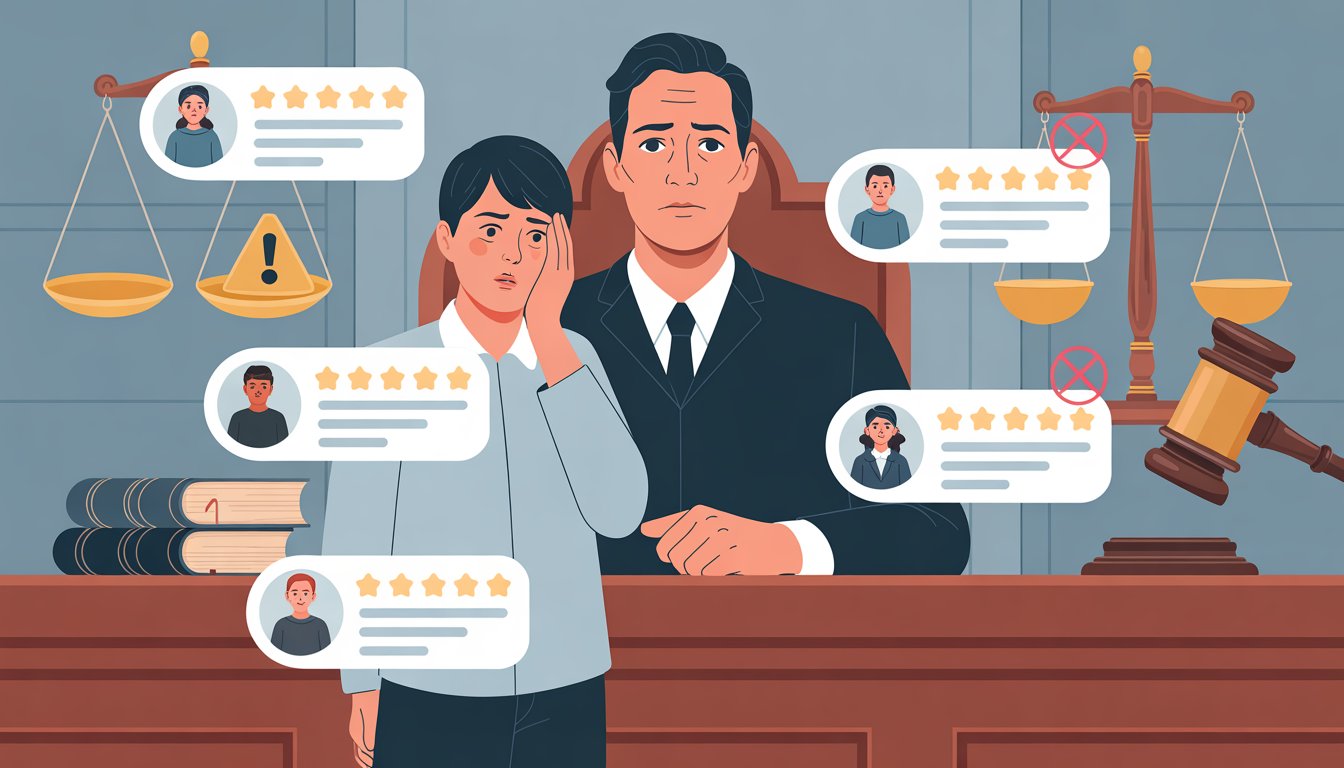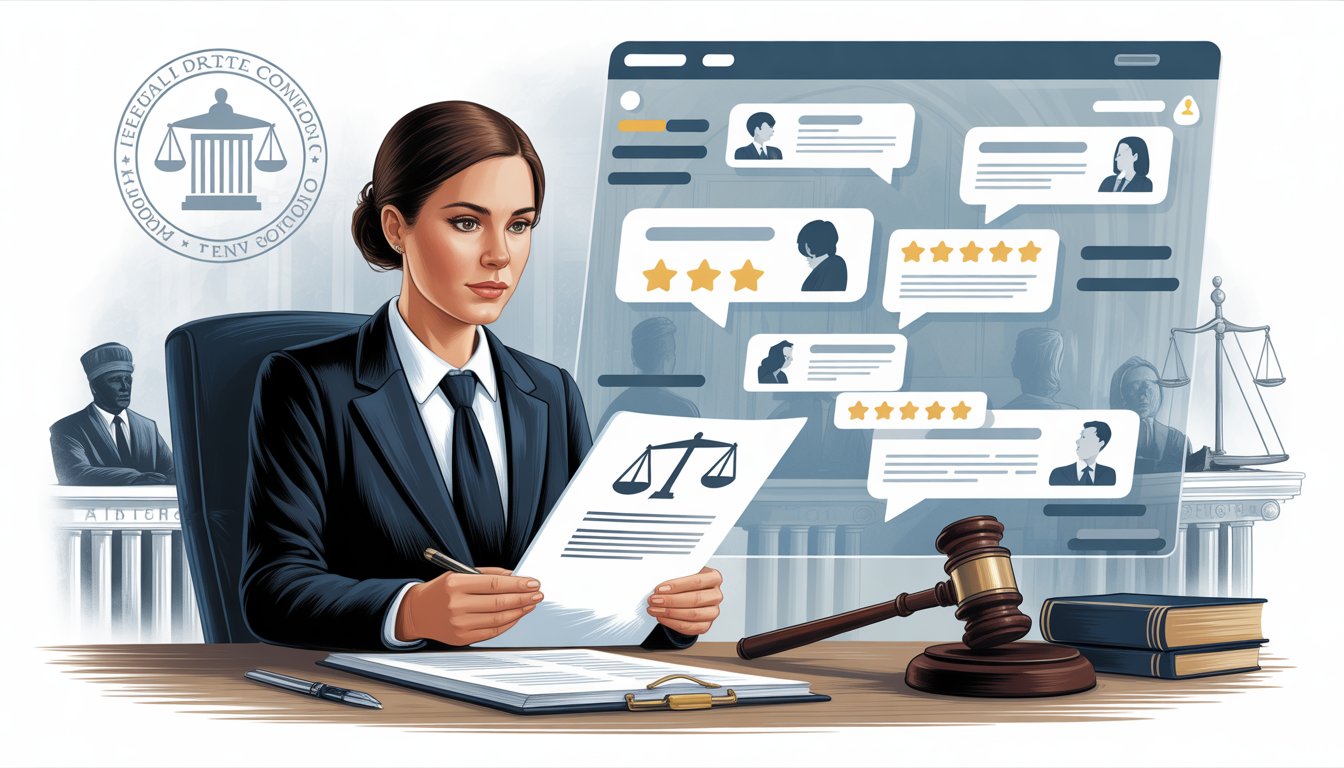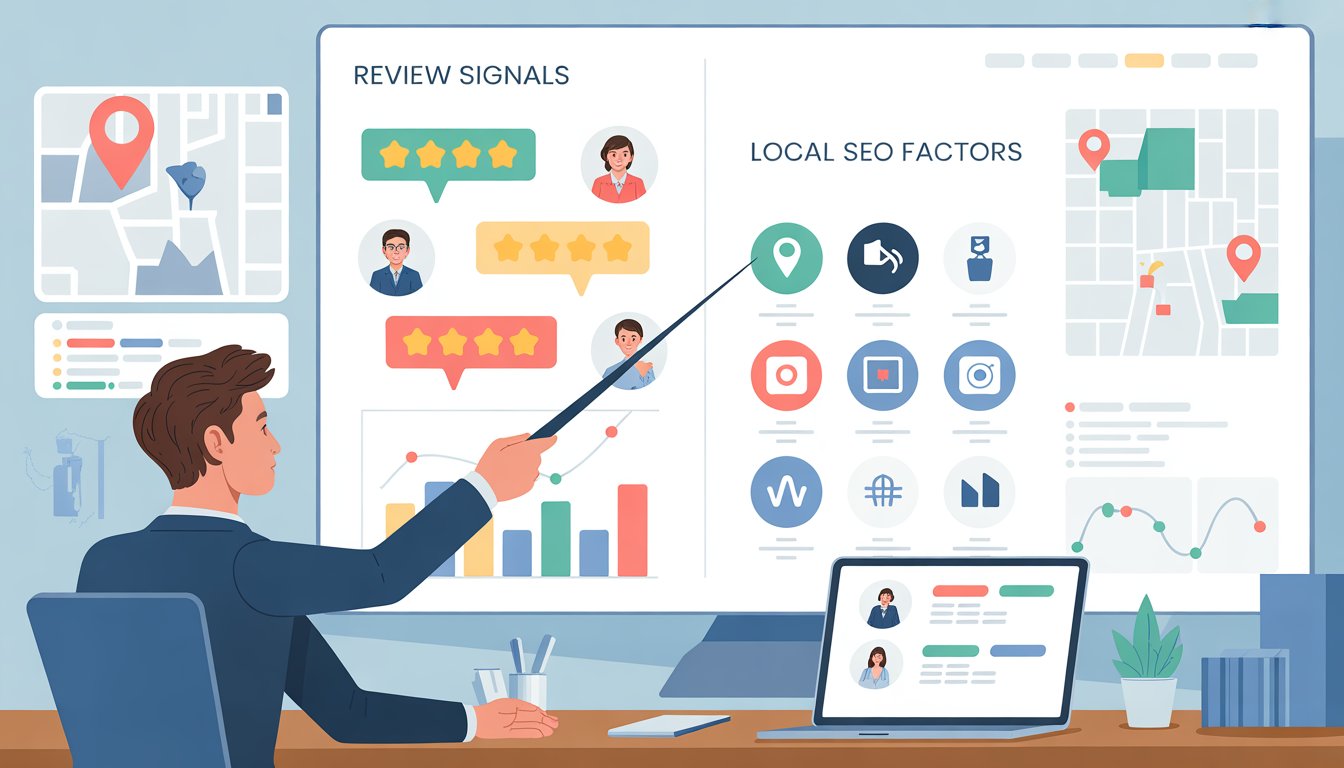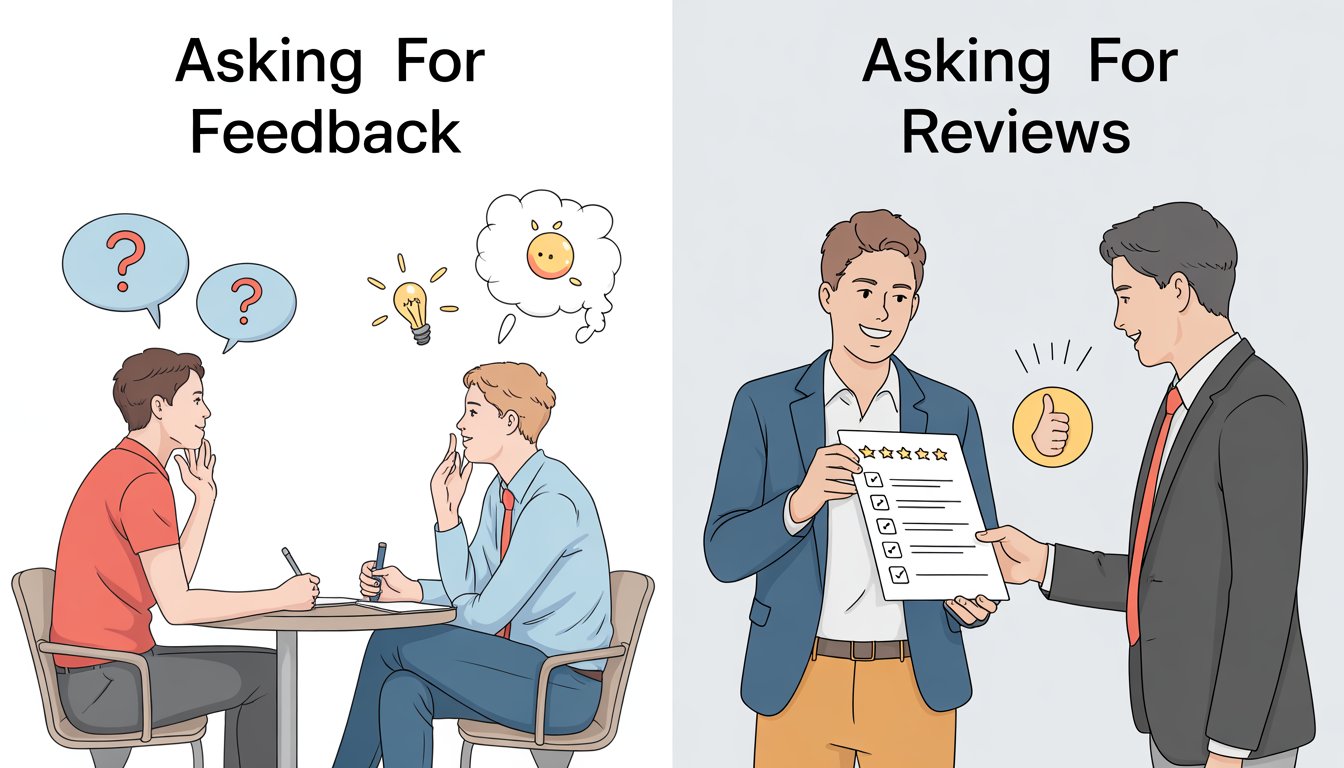Yes, you can face serious legal trouble for posting fake reviews, with federal penalties reaching up to $51,744 per fake review under new FTC rules that took effect in October 2024.
The days of treating fake reviews as a harmless marketing tactic are over, as both federal and state authorities now actively pursue businesses and individuals who create or pay for fraudulent testimonials.

Writing fake reviews puts you at risk of multiple types of legal action. You could face federal penalties from the FTC, state-level fines under consumer protection laws, and private lawsuits from competitors whose businesses were harmed.
Even if you're just an individual writing a single fake review for payment, you can be held personally liable for participating in deceptive practices.
The legal landscape around fake reviews changed dramatically when the FTC's new Consumer Reviews and Testimonials Rule became law. This rule makes it explicitly illegal to buy, sell, or create fake reviews, including those written by AI, business employees, or people who never used the product or service.
Key Takeaways
- The FTC can impose fines up to $51,744 per fake review under rules that became effective in October 2024
- Both businesses and individuals who write fake reviews face legal liability from federal, state, and private lawsuits
- Review platforms also enforce their own penalties including account suspension and public warnings about suspicious reviews
Legal Consequences of Posting Fake Reviews

Fake reviews can lead to serious legal problems including hefty fines, civil lawsuits, and federal enforcement actions.
The Federal Trade Commission now imposes penalties up to $51,744 per violation for creating or buying fake reviews.
Civil Lawsuits and Penalties
You can face civil lawsuits if you post fake negative reviews about a business. Companies may sue you for defamation or slander when your fake review contains false statements that harm their reputation.
The Federal Trade Commission's new rule allows courts to impose civil penalties for fake review violations. These penalties can reach $51,744 for each fake review you create, buy, or sell.
Businesses can also seek monetary damages from you. They may claim lost profits, decreased sales, and damage to their brand reputation caused by your fake reviews.
Common civil penalties include:
- Fines up to $51,744 per violation
- Monetary damages to affected businesses
- Legal fees and court costs
- Injunctions preventing future fake review activity
Criminal Liability for Deceptive Practices
Writing fake reviews can result in criminal charges in some cases. State laws may classify fake reviews as fraud or deceptive business practices.
You could face criminal prosecution if you create fake reviews as part of a larger fraud scheme. This includes running fake review businesses or systematically targeting competitors with false negative reviews.
Criminal penalties vary by state but may include fines and jail time. Some states treat fake reviews as misdemeanors while others classify them as felonies depending on the financial harm caused.
Enforcement Actions by the Federal Trade Commission
The Federal Trade Commission actively pursues cases against people who create or sell fake reviews. Their new rule makes any involvement in fake reviews a federal violation.
The FTC can investigate you for posting fake reviews and impose significant fines. They target both individual reviewers and businesses that buy fake reviews.
FTC enforcement actions may include:
- Civil penalty orders
- Cease and desist letters
- Public disclosure of violations
- Permanent bans from review platforms
The commission works with review platforms like Google and Yelp to identify fake review patterns. They use data analysis to track suspicious review activity and trace it back to individual users.
Federal Trade Commission Rules and Regulations

The Federal Trade Commission has established specific rules that make fake reviews and testimonials illegal, with monetary penalties for violations. These regulations also require proper disclosure for endorsements and apply to both businesses and individuals.
FTC Final Rule on Fake Reviews
The FTC finalized its Rule on the Use of Consumer Reviews and Testimonials in 2024, which went into effect on October 21, 2024. This rule directly prohibits the sale or purchase of fake reviews and testimonials.
Key prohibitions under the rule include:
- Writing or selling fake reviews that real customers did not create
- Purchasing positive reviews or paying for testimonials
- Suppressing negative reviews while only showing positive ones
- Using threats or intimidation to remove bad reviews
The rule considers any review that a real person did not write as fake. This includes reviews written by employees, competitors, or third-party services.
Businesses cannot selectively display only positive reviews. The FTC views this practice as misleading to consumers.
You also cannot use legal threats, physical intimidation, or false accusations to suppress negative reviews. These tactics violate the new regulations.
Disclosure Requirements for Endorsements
When you have any connection to a business you're reviewing, you must disclose that relationship clearly. This applies to all endorsements and testimonials, not just fake ones.
Required disclosures include:
- Payment or free products received
- Employment or business relationships
- Family or personal connections
- Any other material connections
The disclosure must be clear and easy to understand. You cannot hide it in fine print or use unclear language.
Social media posts require disclosures too. Hashtags like #ad or #sponsored work for most platforms.
Consequences for Businesses and Individuals
The FTC can impose civil monetary penalties for violating fake review rules. These fines can be significant and apply to both companies and individuals.
Potential consequences include:
- Civil penalties - Monetary fines for each violation
- Legal action - FTC enforcement proceedings
- Reputation damage - Public disclosure of violations
- Ongoing monitoring - Required compliance reporting
Businesses face liability for fake reviews they create, purchase, or promote. This includes reviews created by employees or contractors.
Individuals who write fake reviews for payment can also face penalties. The rule targets both sides of fake review transactions.
The FTC actively investigates fake review schemes. They use sophisticated detection methods to identify violations.
Platform and Marketplace Policies
Most major platforms have strict rules against fake reviews and use both automated systems and human reviewers to catch violations. These policies can result in account suspensions, business profile removal, and permanent bans from the platform.
Yelp's Review Guidelines and Enforcement
Yelp prohibits fake reviews written by business owners, employees, competitors, or paid reviewers. The platform uses automated filters to catch suspicious activity.
Yelp's detection methods include:
- IP address tracking
- Account age and review patterns
- Writing style analysis
- User behavior monitoring
When Yelp finds fake reviews, it removes them automatically. The platform also places warning notices on business pages with suspicious review activity.
Businesses caught soliciting fake reviews face serious consequences. Yelp may add a "Consumer Alert" to your business page. This red warning stays visible to all potential customers.
Yelp also maintains a list of review solicitation services. If you use these services, your reviews get filtered out.
The platform shares this information with other review sites too.
Other Popular Platforms' Policies
Google My Business removes fake reviews and can suspend business profiles. The platform uses machine learning to spot fake content before it goes live.
Amazon has sued thousands of fake reviewers in court. The company permanently bans accounts that violate review policies.
It also removes products with fake reviews.
Common violations across platforms:
- Paying for positive reviews
- Writing reviews for your own business
- Asking friends and family to review
- Trading reviews with other businesses
- Posting negative reviews about competitors
Facebook and Instagram remove fake content and may disable business accounts. These platforms also limit your ability to run ads if you violate policies.
Reporting and Removal Processes
Most platforms let users report suspicious reviews directly. You can flag reviews that seem fake or violate platform rules.
Typical reporting options:
- Review doesn't reflect real experience
- Reviewer has conflict of interest
- Content contains false information
- Review was incentivized or paid for
The review process usually takes 3-7 days. Platforms review reported content manually when automated systems can't decide.
If your legitimate reviews get removed by mistake, you can appeal. Provide proof of your genuine customer experience.
Include receipts, photos, or other documentation.
Businesses can also report fake reviews about their own companies. Use the platform's business tools to flag suspicious negative reviews from competitors.
How Fake Reviews Are Detected and Prosecuted
Review platforms use advanced technology to spot fake reviews, while government agencies like the Federal Trade Commission investigate businesses that break the rules. Both can lead to serious legal consequences for people who create or buy fake reviews.
Detection by Review Platforms
Review platforms like Yelp use computer programs to find fake reviews. These systems look for unusual patterns in how reviews are posted.
Common detection methods include:
- Reviews posted at the same time from different accounts
- Multiple reviews from the same IP address
- Accounts that only review one business
- Reviews with similar writing styles or phrases
Yelp also tracks user behavior over time. If your account suddenly posts many positive reviews for businesses you never visited, the system flags it as suspicious.
Most platforms use machine learning to spot both human-written and AI-generated fake reviews. The technology gets better at finding fakes as more data becomes available.
When platforms detect fake reviews, they remove them right away. They may also ban the accounts that posted them and flag the businesses involved.
Investigations by State and Federal Authorities
The Federal Trade Commission now has the power to fine businesses up to $50,000 for each fake review. This applies every time a consumer sees the fake review.
The FTC investigates businesses that buy fake reviews or create fake testimonials. They also go after companies that sell fake review services.
Government investigations typically focus on:
- Businesses buying large numbers of fake reviews
- Companies offering fake review services
- Repeated violations of consumer protection laws
State attorneys general can also prosecute fake review cases. They often charge businesses with false advertising or consumer fraud.
These investigations can take months or years to complete. When authorities find violations, penalties include fines, legal fees, and requirements to stop the illegal practices.
Risks for Businesses Using or Soliciting Fake Reviews
Businesses face serious consequences when they create, buy, or encourage fake reviews. These risks can damage your company's reputation and result in removal from major platforms.
Brand Reputation Damage
Your business reputation takes years to build but can collapse quickly when fake reviews are exposed. Customers lose trust when they discover dishonest review practices.
Immediate reputation damage occurs when review platforms flag your fake content. This creates negative publicity that spreads across social media and news outlets.
Consumer trust becomes harder to rebuild after a fake review scandal. Studies show that 73% of customers avoid businesses caught using deceptive practices.
Your competitors may gain an advantage when your fake review scheme is revealed. They can use your mistakes to highlight their honest approach to customer feedback.
Legal costs add up quickly when dealing with fake review investigations. You may need lawyers to handle regulatory inquiries and customer complaints.
Potential Ban from Platforms
Major review platforms actively hunt for fake content using advanced detection systems. Google, Yelp, and Amazon regularly suspend businesses that violate their policies.
Platform bans can last months or become permanent. Your business listing may disappear entirely from search results and marketplace platforms.
Financial losses mount quickly when you lose access to major platforms. Many businesses rely on these sites for customer acquisition and sales.
Appeal processes take time and offer no guarantee of reinstatement. Platforms often require extensive proof that you've changed your practices before considering restoration.
Third-party sellers face additional risks on marketplaces like Amazon. Your product listings may be removed, and inventory can become stranded in warehouses.
Best Practices for Lawful Review Management
Following proper review management practices helps you avoid legal issues while building trust with customers. Encouraging real customer feedback and handling negative reviews professionally protects your business from FTC penalties.
Promoting Genuine Endorsements
The safest way to build your review profile is by asking satisfied customers to share their honest experiences. You can send follow-up emails after purchases asking for feedback.
Always disclose material connections when getting endorsements. If you give free products or pay for reviews, this must be clearly stated.
Create simple ways for customers to leave reviews:
- Include review links in packaging
- Send reminder emails 7-14 days after delivery
- Offer customer service contact info for issues
Never offer payment based on positive ratings. You can offer small incentives for any honest review, but not for specific star ratings or positive comments.
Train your team on proper practices. Employees and managers should not write reviews without clear disclosure of their connection to your company.
Make the review process easy but genuine. Long, complicated forms discourage real customers from participating.
Responding to Negative Reviews Ethically
Handle negative reviews professionally. Do not try to suppress them through threats or intimidation.
The FTC rule specifically prohibits using legal threats to remove unfavorable reviews.
Respond publicly with helpful solutions. Address the customer's concerns. Offer to resolve issues offline when possible.
Common ethical response steps:
- Thank the reviewer for feedback
- Apologize for any poor experience
- Offer specific solutions
- Provide contact information for follow-up
Never make false accusations against reviewers or claim reviews are fake without evidence. This can backfire and create more negative attention.
Avoid asking customers to remove or change negative reviews after resolving their issues. Invite them to post updated reviews about their resolution experience.
Frequently Asked Questions
The legal landscape for fake reviews involves civil penalties, business liability, and potential lawsuits. Understanding specific rules and consequences helps you navigate the risks of creating or posting false reviews.
What are the legal repercussions for posting fraudulent reviews online?
You can face serious legal consequences for posting fake reviews. The FTC's Consumer Reviews and Testimonials Rule allows courts to impose civil penalties for knowing violations.
Businesses can be fined up to $46,517 per violation for fake reviews. If you're in the business of creating or selling fake reviews, you face liability under Section 465.2(a) of the rule.
Ordinary consumers typically cannot be held liable under the FTC rule for what they say in reviews. Influencers who lie about using a product or their experience with it can face legal action.
You might also face defamation lawsuits if your fake review contains false statements that harm a business's reputation. These civil lawsuits can result in monetary damages.
Can individuals or businesses face lawsuits for publishing fictitious testimonials?
Yes, both individuals and businesses can face lawsuits for fake testimonials. Businesses face the highest risk since they control the advertising message.
If you're a business that knowingly uses false testimonials, you violate federal trade rules. You can be liable even if someone else created the testimonials, as long as you knew or should have known they were fake.
Advertising agencies, PR firms, and reputation management companies also face liability. They can be held responsible for writing, creating, or selling fake testimonials.
Influencers who lie about their experience with products can face legal action. This applies when you're in the business of posting testimonials about products or services.
What are the Federal Trade Commission's guidelines on false advertising through customer reviews?
The FTC's rule prohibits writing, creating, or selling fake consumer reviews and testimonials. This includes both human-written and AI-generated fake reviews.
You cannot pay for reviews that must express a particular sentiment. You can offer incentives for honest reviews as long as there's no requirement for positive or negative opinions.
The rule distinguishes between hosting and creating reviews. If you simply host reviews on your website without writing or buying them, you're generally not liable for fake ones submitted by others.
You must watch for red flags when hiring influencers or buying reviews. Quick posting times, unusual review volumes, or reviews mentioning wrong products indicate potential problems.
What consequences might a person face for writing a fake negative review?
Writing fake negative reviews can lead to defamation lawsuits. You face legal action if you knowingly write false statements that damage a business's reputation.
The main legal risk comes from libel claims. Businesses can sue you for monetary damages if they prove your fake negative review contained false information and harmed their reputation.
You might face criminal fraud charges in extreme cases. This typically happens when fake reviews are part of a larger scheme to deceive consumers or competitors.
Some states have specific laws against fake reviews. These laws can result in fines and other penalties for individuals who create false negative reviews.
How can false online reviews be detected and traced back to their source?
Platforms use algorithms to detect suspicious review patterns. They look for unusual posting speeds, similar writing styles, and accounts that only post extreme ratings.
Digital forensics can trace reviews to specific devices and IP addresses. This technology helps identify coordinated fake review campaigns and their sources.
Businesses often hire forensic experts to analyze suspicious reviews. These professionals can trace fake reviews back to their creators using technical evidence.
Review platforms share data with law enforcement when investigating fake review schemes. This cooperation helps authorities identify and prosecute people running large-scale fake review operations.
Does the law differentiate between fake positive and fake negative reviews?
The FTC rule treats fake positive and negative reviews equally. Both types violate the same legal standards and carry similar penalties.
Section 465.4 specifically prohibits buying both positive and negative consumer reviews. The law doesn't distinguish between the two when determining violations.
However, fake negative reviews may carry additional defamation risks. You face higher chances of libel lawsuits when posting false negative information about businesses.










